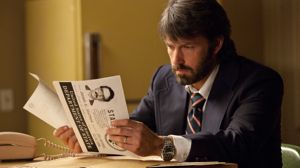Hollywood has a habit of recklessly re-writing history to sell a story. It's entertainment, so no one's complaining--well, except for researchers like you. In your line of work, fudging the facts might be disastrous. But for Tony Mendez and the six American diplomats trying to sneak out of Iran during the revolution of 1979, getting a detail wrong would have been deadly. We feel those consequences to maximum effect in Argo, a masterfully suspenseful dramatization of the now-declassified rescue mission, reconstructed with incredible period detail by you and director Ben Affleck.
The vintage Warner Brother's logo fades into a condensed history of Iran, helping us non-history-buffs catch up on the sociopolitical mood of Iran in the late 70s. The technique works beautifully, employing illustrated storyboards, that pre-production staple, to foreshadow the upcoming film-centric story. Six Americans have escaped the overrun U.S. embassy, taking refuge at the Canadian Ambassador's home with no way out until CIA operative Tony Mendez (Ben Affleck) cooks up a plan for them to pose as a Canadian film crew. The stakes are sky-high, not just for the individuals involved, but for two countries teetering on the edge of war.
To make this cover story believable, Mendez does you proud by doing his research. He flies to L.A. to start up a production office and recruits the help of some Hollywood handy men played by John Goodman and Alan Arkin, who offer wonderful moments of comedic reprieve. As a director, Affleck strikes a perfect balance, never undermining the importance of the trip by getting too silly, and drawing the audience in with compelling inter-character drama.
When things ramp up, we see the Iranians literally piecing together clues, even using child labor to assemble shredded documents. It's an archeological-level excavation that needs to be completed in days, not years, and would probably put most academics to shame. Research by both factions is ratcheted up to a breakingpoint until it skillfully unravels. The tension is made more powerful for those us unfamiliar with the real-life details by your commitment to putting them onscreen. Of course, even if we know the broad strokes (Affleck had no problem spelling those out at the TIFF premiere), it's a credit to everyone involved that the overall drama is always credible.
Of course, retelling history with emotional textures requires a certain flair that research alone cannot provide. Just like the characters themselves, you need imagination and informed invention to fill in the gaps. But unlike the Iranian Imperial Guard, I have no interest in checking your sources. I did, however, appreciate the final credit sequence that offers a side-by-side comparisons of actors with the real-life people they portrayed and shows the perfect replicas created by the production design team.
Ultimately, I bought everything. You did your research well enough to convince me that you deserve to pass the checkpoint.
Studiously yours,
Christopher







